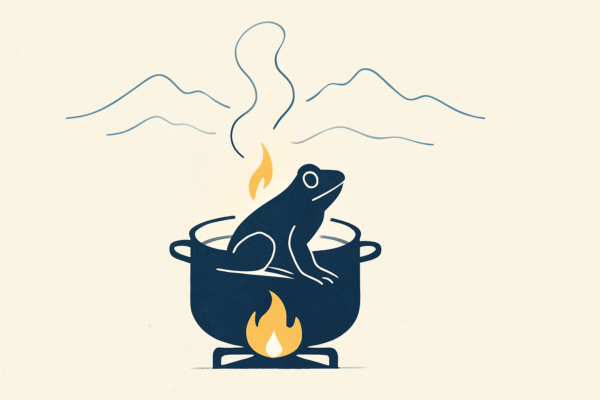“The more we value things outside our control, the less control we have.” — Epictetus, Discourses
If you still think “being in control” means you actually are… maybe it’s time for a wake-up call.
It’s not your fault. You were sold the usual dream: more meetings, more dashboards, a LinkedIn headline that sounds enlightened but smells like burnout.
Then reality shows up—new algorithm, traffic drop, or just another Monday kicking your door in.
And there you are again. Stuck. Chasing things you can’t change, while the stuff that really matters sits on the bench.
Sound familiar?
Epictetus had it right ages ago: the more you cling to things outside your control, the less control you actually have.
And when your head’s not clear? Neither is your business. Or your focus. Or your future.
Stoicism isn’t a quote to post. It’s a mindset to train—so when the storm hits, you don’t flinch. You choose what matters. You move.
Stoicism is built on four simple Virtues:
Wisdom. Courage. Justice. Temperance.
More about them in a second.
Stoicism is built on four simple Virtues:
Wisdom. Courage. Justice. Temperance.
Just you, choosing the kind of person you want to be when life doesn’t play fair.
This philosophy won’t make you rich. But it might just stop you from spiraling every time things fall apart—like delayed flights, snarky emails, or those tragic olive mortadella sandwiches they keep serving at corporate events.
At the end of this piece, you’ll find 20 Stoic quotes. Not for inspiration. For recalibration.ay — to help you start your journey toward a calmer and more resilient mindset in just 20 days.
A Pragmatic Philosophy
Stoicism didn’t survive 2,000 years because it sounded clever.
It survived because it works.
No fluff. No mental gymnastics.
Just practical tools for real life.
It’s not about debating the meaning of life.
It’s about handling it—calm, clear, and steady.
Align your actions with reason.
Focus on what you control.
Let the noise pass.
That’s how you build peace that holds.
Even when the outside world doesn’t.
Eudaimonia and The 4 Stoic Virtues
Stoic philosophy is structured around pursuing eudaimonia, often translated as “happiness” or “human flourishing.” However, its true meaning lies in achieving a state of serenity and fulfillment through living by virtue and reason, aligning oneself with the rational order of the universe.
The true meaning of Eudaimonia likes in achieving serenity.
… and the virtues?
Stoicism runs on four core virtues
Simple words with serious weight
Not suggestions
A standard
This is what builds real peace
Real strength
Not quotes or morning routines
Wisdom
See things as they are
Not as you fear
Not as you wish
Facts over feelings
Data over drama
That’s how clear decisions are made
In life
In work
In money
Courage
Do the hard thing
Feel the fear
Do it anyway
Uncertainty doesn’t wait
Neither should you
Justice
Play fair
Even when others don’t
It’s not about being nice
It’s about being right
In your choices
In your impact
Even where your money goes
Temperance
Hold the line
No overreactions
No indulgence
No chasing
No fleeing
Just steady, deliberate action
The Dichotomy of Control
Epictetus gave us one of Stoicism’s most powerful tools
The dichotomy of control
Know what’s yours to change
Know what isn’t
That’s it
It sounds simple
It changes everything
Most stress comes from fighting what we can’t fix
Most peace comes from letting it go
Focus only on what’s in your hands
Your choices
Your effort
Your response
That’s where your power is
That’s where calm begins
And that is also where this post ends, more in Part 2.
🎯 Remember
You don’t need to control everything
You just need to control yourself
That’s enough
That’s always been enough





